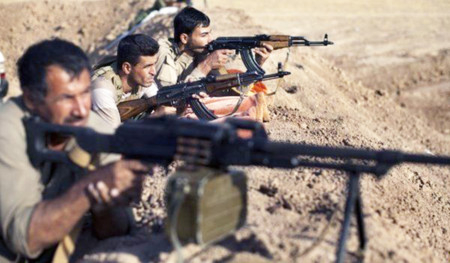
Iraq is threatened by a festering Kurdish-Arab conflict over the oil-rich city of Kirkuk following the latest escalation triggered by the Kirkuk Provincial Council’s decision to raise the Kurdistan flag next to an Iraqi flag over state buildings.
The Kirkuk Provincial Council decision, secured courtesy of a majority, saw some Arab and Turkmen representatives boycott the vote, worried that this could be an attempt by Kurdish parties to assert their identity in the multi-ethnic city.
The flag incident led to heated debates led by Kurds who are demanding a referendum to decide the future of the city. It also brought the dossier of the Kurdistan region and the dream of independence to the fore, casting doubts on the prospects of stability in Iraq in the post-Daesh (self-proclaimed Islamic State of Iraq and the Levant) era.
The Kurdish issue in Iraq is as old as the Iraqi state. The issue has witnessed its ups and downs during both royal and republican rule. However, it entered into a new phase on March 11, 1970 when an agreement of self-rule was signed by the Iraqi government and Kurdish leader Mulla Mustafa Barzani. Under the agreement, the Iraqi government recognised the national rights of Kurds, guaranteeing the sharing of power and the use of the Kurdish language in educational institutions. However, things did not go as planned, with the government failing to honour its commitment, thus pushing the issue back to square one and draining financial resources that would have benefited Arabs and Kurds alike.
This issue had taken a significant turn, in favour of the Kurds after the fall of the Saddam Hussain regime. The Kurds enjoyed a federal region as stipulated in the Iraqi constitution, which regulates its relations with the central government. The Kurdistan region has seen growing interest from neighbouring countries, and Iraq’s Kurds enjoy close ties and a geographical network with Kurds in Turkey, Iran and Syria looking to secure the same rights and privileges they enjoy.
Among the pitfalls and obstacles that blocked the way to a final settlement of the Kurdish issue was the ownership of the disputed territories, including Kirkuk — an issue not handled in a timely manner. A mechanism was established for its approach as stipulated in Article 58 of Iraq’s transitional Administrative Law, which was set by US administrator Paul Bremer. The same article was then carried into the Permanent Constitution under Article 140, and later under Article 24 of the Provincial Election Law.
Complex issue
Although there has been 14 years, this constitutional article remained inactivated despite the repeated Kurdish demands. The ongoing war against Daesh has allowed Kurdish Peshmerga forces to impose a fait accompli on the ground despite opposition by Turkmen and Arabs, as well as other smaller ethnic groups in Nineveh.
Since the fall of Saddam’s regime, most of the contentious issues that erupted between Baghdad and Arbil were solved by temporary compromise solutions in view of the mounting concerns over Iraq’s unity. Such concerns were voiced by some political blocs, which had earlier opposed the law on the formation of regions.
The problem of Kirkuk is very complicated due to its position as Iraq’s second oil-rich city and its mosaic composition, given that it is home to all ethnicities, religions and sects in Iraq. The three ethnic rivals — Kurds, Turkmen and Arabs — failed to reach a compromise to solve the complexity of Kirkuk due to many reasons. The most notable of these reasons was low confidence, resulting in a situation that saw them question each other’s intentions.
The importance of Kirkuk transcends Iraq’s boundaries as it demands regional or international attention and subsequently intervention. Turkey has not concealed its concerns over ongoing events in Kirkuk or decisions regarding it. The US has its reservations, with its Department of State having already expressed its dissatisfaction and opposition to any unilateral action.
There is no doubt that the Kurds have the right to decide their fate and future, as well as formulate their decisions in compliance with international laws. They have the right to stay within the federal state of Iraq or to separate and establish their own state. Bearing in mind the state of instability in the region, several questions arise here. Will the semi-autonomous Kurdistan region be better off if it separates from Iraq? Are the relations binding the Kurdish leaders with neighbouring countries based on a peer-to-peer formula?
There is a worrisome matter related to the inter-Kurdish relations, which are not good owing to power struggles within the leadership. Such a struggle may turn into an armed conflict as has happened before.
Although the various Kurdish blocs lined up behind the recent decision by the Kirkuk Provincial Council, this cannot conceal the struggle for influence and power within Kurdish parties. This was seen when the parliament voted to remove Finance Minister Hoshiyar Zebari over the misuse of public funds.
Some Kurdish blocs are likely to enter into alliance in preparation for the forthcoming parliamentary elections, and this approach would weaken the strength of some Kurdish entities. There are certain conditions to conduct a referendum on Kirkuk’s future in accordance with the Iraqi constitution, especially after the country’s many regions, including Kirkuk, have seen demographic changes throughout various eras, with this era being no exception..
Mohammad Akef Jamal is an Iraqi writer based in Dubai.










